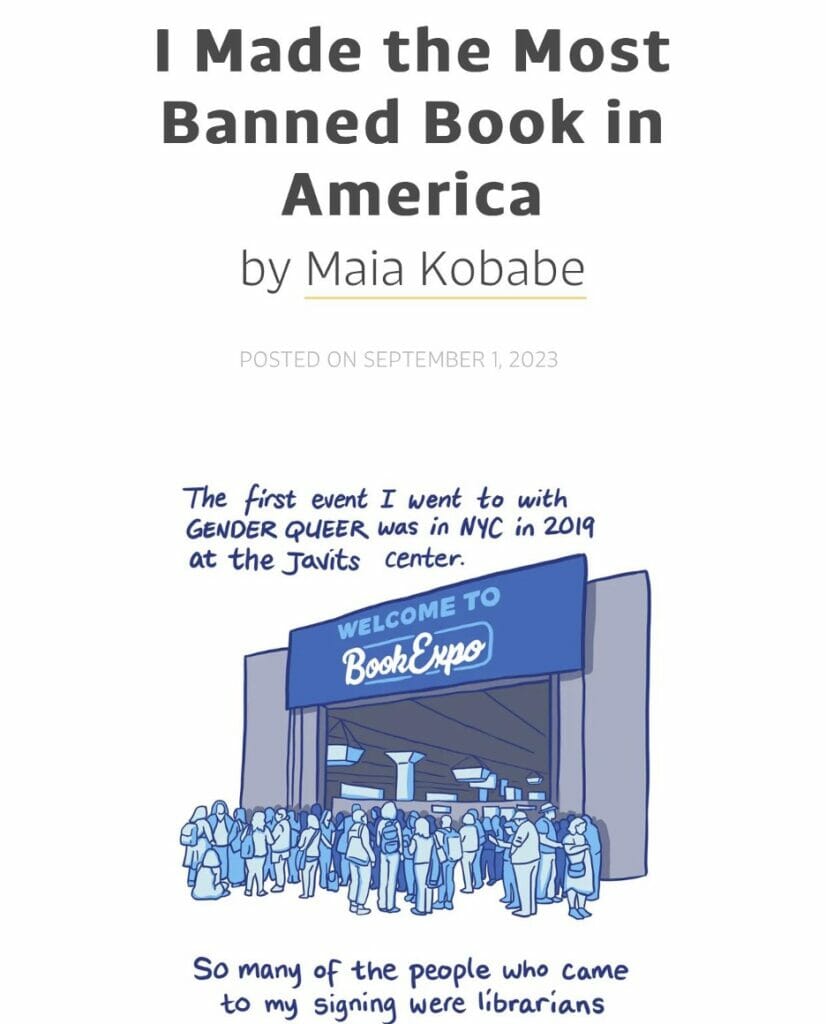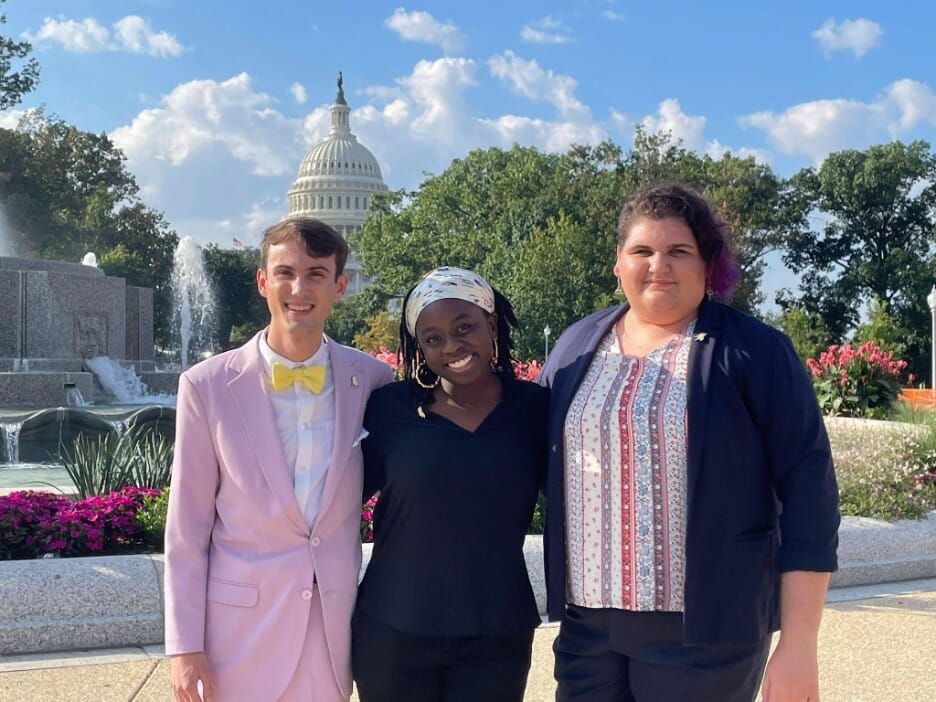This week, book bans took the national spotlight as the U.S. Senate Judiciary Committee heard testimony from Illinois Secretary of State Alexi Giannoulias about a soon-to-be-enacted law in his state that prohibits schools from pulling books from their shelves. Giannoulias was joined by student activist Cameron Samuels (honored as one of GLAAD’s “20 Under 20” in 2022), who spoke out about the impact book bans have on the key stakeholders – students – as well as the dangers of censorship.
“Historically, censorship is never on the right side of history. My state is home to eight million people under the age of 20,” Samuels said. “Since everything is bigger in Texas, we lead the nation in book bans.”
View this post on Instagram
Read on to see how banned author Maia Kobabe is again lending their voice and talents to combat misinformation and share resources to fight book bans, and how elected officials and community members are finding creative ways, as well, to challenge book bans, emphasize the need for youth to see themselves reflected in books, and ensure access to informative and affirming titles.
California: Anti-Book Ban Bill One Step Closer to Passage
California is set to become the second state in the country to propose a statewide ban on discriminatory book bans and curriculum censorship, following Illinois’ House Bill 2789. The bill passed the State Senate and is now awaiting signature by Gov. Gavin Newsom. According to Sacramento’s KCRA, the bill’s author, Assemblyman Corey Jackson, noted “It will ensure California pushes back against the disgusting practice of engaging in culture wars by stepping on the backs of vulnerable populations for political gains.”
The bill was written in response to the Temecula Valley Unified School District, which refused to integrate a lesson that honored Harvey Milk, an out gay politician and first to be elected to office in California, who was assassinated in 1978. The bill mandates that school boards statewide ensure access to textbooks that “accurately portray the cultural and racial diversity of our society.” Districts that refuse to comply would be subject to a reduction in state funding.
California is the true freedom state: a place where families — not political fanatics — have the freedom to decide what’s right for them.
With the passage of legislation to ban book bans & ensure all students have textbooks, our state’s Family Agenda is now even stronger. pic.twitter.com/RG9nnYd32u
— Office of the Governor of California (@CAgovernor) September 8, 2023
Illinois: State Law Banning Book Bans Goes into Effect Next Year
Setting a historic precedent, Illinois’ Gov. J.B. Pritzker signed House Bill 2789 into law this past June. Going into effect Jan. 1, 2024, HB2789 renders libraries that engage in book censorship efforts “ineligible for state funding.” In a press release, Gov. Pritzker said the state “embraces” the truth: “Young people shouldn’t be kept from learning about the realities of our world; I want them to become critical thinkers, exposed to ideas that they disagree with, proud of what our nation has overcome, and thoughtful about what comes next.”
On September 12, Illinois’ Secretary of State Alexi Giannoulias, who recently launched a website for people affected by book bans to share their stories, testified before the U.S. Senate Judiciary Committee. Likening book bans to “authoritarianism,” Giannoulias said “the need to stand up and fight for our freedoms and our librarians” is the reason he initiated HB2789. “This legislation is important, because both the concept and practice of banning books contradicts the very essence of what our country stands for and what our democracy was founded on.”
Illinois Secretary of State Alexi @Giannoulias is set to appear before the Senate Judiciary Committee for a hearing on book bans, after passing the nation’s first legislation to prevent the bans.#GMA3 pic.twitter.com/va412LdrQq
— GMA3: What You Need To Know (@ABCGMA3) September 12, 2023
New Jersey: Hoboken Becomes a “Sanctuary for Books”
New Jersey moves ahead with its own anti-book ban bill, S3907, which would mandate that public libraries and schools adopt the American Library Association’s Library Bill of Rights and threaten loss of funding to schools and public libraries that participate in book bans. The bill is currently under review by the Senate Education Committee.
In the interim, the city of Hoboken has taken steps to support banned books and vulnerable readers. Following a June Banned Books Read-A-Thon hosted by the city’s public library that made them a target by extremists on social media, the Hoboken City Council voted unanimously to approve a resolution declaring Hoboken as a Book Sanctuary City. More than just a fancy title, the measure aims to keep targeted books on library and school shelves and show solidarity with libraries nationwide.
The Hoboken City Council passed a resolution Wednesday evening that makes Hoboken a “book sanctuary” — essentially a place that bans book bans.https://t.co/3P1s6C0mSf
— NBC New York (@NBCNewYork) September 7, 2023
Vermont: State’s Lieutenant Governor Hits the Road to Discuss Freedom to Read
Vermont Lt. Gov. David Zuckerman recently embarked on a Banned Books Tour. Spurred by book censorship efforts in other states, Zuckerman has traveled to libraries and bookstores statewide, joined by guests that include local authors, to read and discuss banned and challenged titles.
At an event in Rutland City, Zuckerman said he hopes his efforts will lead community members to say, “Wait a minute, the founding principles of our country are about information, the full breadth of information, the truth — whether we like the truth or we don’t like the truth — critical thinking (and) critical conversations.”
View this post on Instagram
High School Librarian Creates Book Resumes to Respond to Challenges
GLAAD’s Book Bans – A Guide for Community Response & Action toolkit emphasizes the need for freedom to read advocates to do their due diligence by researching and gathering facts when responding to book challenges. One high school librarian offered a brilliant suggestion: compile a “book resume.”
Speaking at a School Library Journal (SLJ) Censorship Town Hall, librarian Martha Hickson suggested creating a “book resume” to inform school and library boards, as well as parents and the media, about the value of challenged titles. The book’s resume summarizes reviews, lists awards received, and recaps news stories where the outcome results in libraries retaining the book. SLJ shared a resume Hickson created for the frequently challenged graphic memoir, Maia Kobabe’s Gender Queer.
For their part, Kobabe has again turned to their artform to tell the story of how librarians have supported Gender Queer on behalf of the vulnerable readers and students, and how we, in turn, must now support librarians.

From: The Nib/Maia Kobabe
In the graphic essay I Made the Most Banned Book in America, Kobabe describes how librarians were among the first to recognize the impact of the visibility and representation reflected in Kobabe’s memoir, how the majority of the hundreds of book challenges nationwide are fueled by a tiny number of copy and paste extremists, and how everyone can support their local libraries, librarians, and the freedom to read.
“We need to make the voices supporting diverse books & opposing book bans even louder,” Kobabe wrote, including showing up to speak up for books at library and school board meetings, and sending notes of thanks to libraries and librarians for their diverse displays at Pride and for Drag Story Hour.
“Make sure they feel the love stronger than the hate,” Kobabe urged.

From: The Nib/Maia Kobabe
Community Members Organize for Access to Banned Titles
Some Florida churches are taking decisive steps to counteract restrictive laws severing childrens’ access to books about race, gender identity, and sexuality, including those written by queer authors and LGBTQ people of color. Tampa-based Beulah Baptist Institutional Church partnered with the NAACP to host the region’s first Freedom Library. In May, The Unitarian Universalist Church of Tallahassee (UUCT) shared similar plans to gather a list of banned books, purchase as many as they could, and make them available on a book cart after Sunday service.
The Little Free Library movement is also finding ways to open its doors to more stories and experiences. Its signature boxes can be found in the United States and more than 100 other countries, with a mission “to be a catalyst for building community, inspiring readers, and expanding book access for all.”
Freedom to read advocates like Houston, Texas resident Jennifer Clements are becoming makeshift librarians by opening more Little Free Libraries in their communities and expanding their offerings. In an interview with Click2Houston, Clements explained her process for determining which books to order: “I have a friend whose mom is a teacher, and she just sends me her list. Every time a book gets banned, she immediately sends it to me and then we order the book.”
@jenwildebooks trying to fight local queerphobia with some gay books! ✊🏻 🏳️🌈 🏳️⚧️ 📚 #LGBTQBooks #QueerBooktok #SapphicBooks2023 #LittleFreeLibrary #LittleFreeLibraryRestock #LittleFreeLibraryVisits #LittleFreeLibraries #StopBanningBooks #Pride2023 #ReadWithPride #SapphicYABooks #JenWilde #JenWildeBooks #QueerBooktok #SapphicBooktoker ♬ You Need to Calm Down – Sassydee













